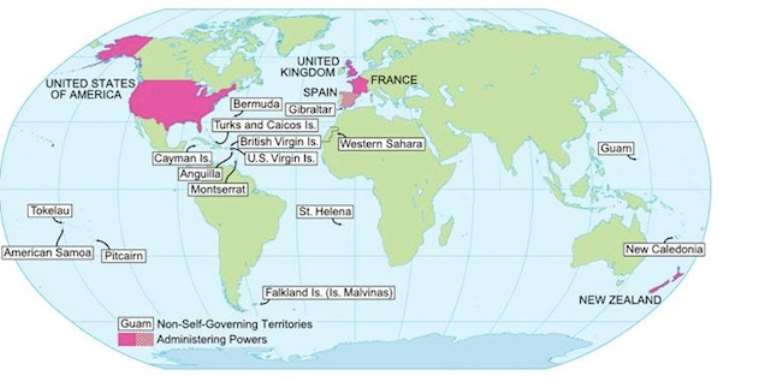WHY DECOLIZATION AND INDEPENDENCE DON'T WORK WHERE DETERMINATION WOULD

It is fact, if not on record, that neither decolonization nor Independence worked for African countries. The effects of such failure are still evident today, exemplified by the current stunning revolution sweeping through former colonies long ago “decolonized” and “Independent” in Northern Africa (while the rest are a ticking time bomb); and by the relative backwardness of Africa in general, even though it sits on enviable and stupendous wealth-generating resources.
Hence, a closer attention ought to be paid to the UN plans for “decolonizing” and granting of Independence to the remaining 16 Non-Self-Governing Territories, as reported in the article in the UN News Centre of February 24, 2011, titled: “Advancing decolonization process will require greater efforts by all” http://www.un.org/apps/news/story.asp?NewsID=37616&Cr=decolonization&Cr1=
in dealing “with decolonization, the administering countries and the remaining 16 Non-Self-Governing Territories so that the people of these territories can exercise their right to self-determination.…” –UN Sec Gen, Ki-moon.
Why mind the UN plans and process? Because such triangulation of terms, “decolonization,” “Independence” and “Self Determination,” bandied around by the relevant UN Committee in this matter, could define a post-colonial sociopolitical structure and system which will suffer similar ills as post-colonial African countries. What has the world learned about the obvious failure of Decolonization and Independence to bring about liberty, freedom and advancement to Africa?
Decolonization fails because taking out and replacing colonial officers with indigenous officials (which is exactly what happened in Africa) does not take away the original and embedded colonial intent, construct and colonial mentality, the essence of colonialism. Colonial Europeans might have left Africa, but the colonial system they coaxed out of and coerced Africans into stayed behind, still potent, still operative.
“Independence” failed because it did not address the Liberty and Freedom of the colonially balkanized and subjugated peoples of Africa: rather, it promoted the original objectionable colonies into official, full-fledged States with the UN stamp of approval, diplomatic recognition and rights as “countries.” In the past, this point would have represented a subtlety, but the ongoing Northern Africa / Arab revolutions remind and teach the world that there is in fact a difference between the people and “their” government or State, and serious incongruities can and do exit between the two entities (the story of Africa), enough to cause paralyzing dysfunction (Africa’s current status) and or prompt drastic solutions (Africa’s ongoing experience).
What makes decolonization and Independence failures makes Self Determination successful. Self Determination starts with the premise that a people / group have original inalienable rights of Sovereignty and independence and should have control over their destiny and resources: their nationhood, dignity and humanity ought to be recognized and respected. Self Determination is people-centered; and in so far as the “State” is concerned, Self Determination avers and insists that the right of the people takes precedence over the State—naturally because it is in fact the people who make the State; it should not be the other way around.
If this lesson has been learnt well and there is a willingness to apply it to the case of the 16 remaining non-self-governing groups / peoples, then, a logical and consistent process would be to
1) recognize, respect and restore the right to Self Determination of each of them. This means that, right away, the UN recognizes that each one of them is already sovereign, as well as “independent”—in the real sense of it. The UN and the world should then treat each one of those peoples or groups as such.
2) remove whatever balkanization structures that the colonialists might have introduced, allowing the peoples to return to their natural sociocultural configurations, which may or may not involve physical movement or migration.
3) encourage and support the self-determined peoples to form consenting, mutually beneficial and equitable relationships and associations where and when possible and or necessary. This includes continuation of now restructured and reconfigured previous relationships, brand new ones, or none at all if it is not in the interest of that party, in the areas of politics, commerce and economy, and others.
4) allow and oversee an agreed-upon period of adjustment and settlements, to accommodate processes such as referendums, controlled population movements, division of obligations and assets, border adjustments, and so on.
This process is to be centered on the caveat that if there is a break at any phase, the fall-back position and status is that of officially recognized Self-determined entities: sovereign, independent nations of peoples, each in full control of its own people’s affairs and destiny.
What about sickly Africa? It is never too late to apply the above to Africa: Self Determination can be offered and practiced in Africa in a controlled process, with positive results—at least better than what applies today, which doesn't take much. Alternatively, people will eventually in fact exercise it in the form of a revolution, as is happening right now, in which case, no post-colonial African country is really immune; none will be spared. Self Determination is indeed a good thing, especially for Africa.
